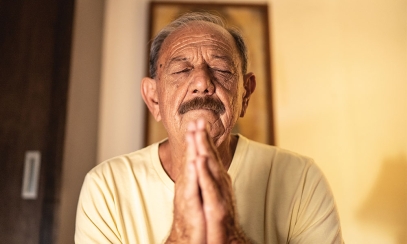
Staying on the path to holiness
The virtue of self-restraint
The virtue of self-restraint
We’ve all been there: “I’ll just have another bite.” And before we know it, the whole slice of pie is gone. Don’t get me wrong: I love a thick piece of decadent cheesecake or a heaping bowl of ice cream every once in a while. But all too often, even when we know something’s not good for us, we have difficulty stopping. This pertains not just to the physical but also to the emotional: worry, jealousy and rampant self-criticism, for example.
We’ve all been there: “I’ll just have another bite.” And before we know it, the whole slice of pie is gone. Don’t get me wrong: I love a thick piece of decadent cheesecake or a heaping bowl of ice cream every once in a while. But all too often, even when we know something’s not good for us, we have difficulty stopping. This pertains not just to the physical but also to the emotional: worry, jealousy and rampant self-criticism, for example.
The Ancient Greek philosopher Socrates cautioned that everything should be done in moderation. Aristotle further named moderation as a moral virtue. Being able to enjoy things without going overboard is not a new concept, but it still can be challenging. It takes the cultivation of a rather unpopular virtue: self-restraint, or self-discipline.
Self-restraint is a spiritual practice that dates back to the early Church. From rigorous Lenten fasting to the ascetic lifestyles of monks, restraining ourselves from certain pleasures can actually build character and bring us closer to the Lord.
By saying “no” to the extra piece of cake or watching yet another episode of our favorite show, we are practicing for the times we have to deny even greater temptations. When we have the urge to act out behaviors with serious implications – excess alcohol consumption, road rage, lying, or cheating, to name a few – we can dig deep and enact what we’ve rehearsed before on smaller things.
Moreover, we can spend less time on what harms us and others and more time on what heals us and brings us peace, such as moments with our loved ones.
Self-restraint can even improve our personal relationships. The Book of Proverbs advises: “Where words are many, sin is not wanting; but those who restrain their lips do well.” (10:19) When we enter into conflict with our loved ones, why open deep wounds or dig up the past? Why say something hurtful in the heat of the moment? A little self-restraint could go a long way. And it starts with the small things.
Proverbs also tells us that “A man without self-control is like a city broken into and left without walls.” (25:28) When we let temptations and bad habits control us, we are left broken and vulnerable. But when we harness the power of self-restraint and practice it, we strengthen our character for when it really counts: choosing God above all things.
Theological Virtues
Faith
Hope
Charity
Cardinal Virtues
Prudence
Justice
Fortitude
Temperance
Veronica Szczygiel, Ph.D., is the director of online learning at Fordham University’s Graduate School of Education.



